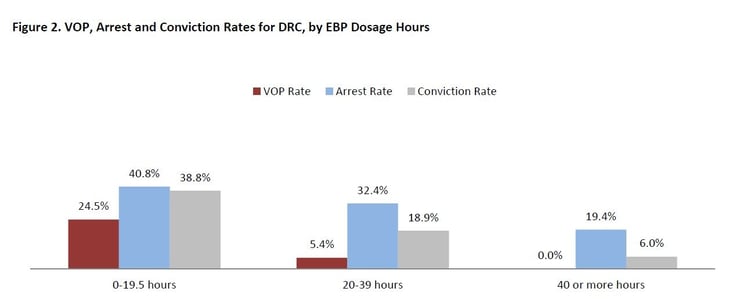The Probation Evidence Based Programming (EBP) team at Victor Community Support Services in Stockton is doing an impressive job changing lives. The San Joaquin County Probation Department released data from the Day Reporting Center (DRC) showing significantly reduced rates of re-offenses by clients who are on probation as their hours spent in evidence based programming increased (see graph below). This shows that even adults with criminal histories can make major life changes when given the help and resources they need.

This report focuses on a sample of 153 DRC clients and takes a comprehensive look at the recidivism (a fancy word for re-offense) rate 365 days since enrollment. You can view the full report here.
The DRC report references a case study that tells the personal story about an individual with the primary offense of recurring burglary, who also had a risk factor of high drug use.
Challenges for this client were:
- Finding support amongst family/friends
- Finding a positive living environment
- Unhealthy relationships
- Triggers/old habits
- Decision making
- Reporting requirements of the program
- Attending and completing evidence based program classes
- Finding employment
 A particularly difficult challenge the client faced was words or situations that came up during class that were “triggers” and forced the client to confront their emotions. For example, prior to the program the client would watch commercials that would trigger their desire to steal. A tool that helped him/her break the desire to steal was the phrase “Now and Later.” This reminded the client to ask themselves if what they felt they needed to “get” now could be pushed to later.
A particularly difficult challenge the client faced was words or situations that came up during class that were “triggers” and forced the client to confront their emotions. For example, prior to the program the client would watch commercials that would trigger their desire to steal. A tool that helped him/her break the desire to steal was the phrase “Now and Later.” This reminded the client to ask themselves if what they felt they needed to “get” now could be pushed to later.
The client stressed how the facilitators and the probation officers walked him/her through the effects of the triggers by meeting after class and taking the time to talk.
“It got easier when I began to identify who I was through the class through role playing. I got to see myself in others.”
Facilitators of the program also offered extra homework the client could focus on when faced with difficult times on their own outside of class.
The client was able to put these newly learned skills into practice when a situation with a family member that had the potential to escalate and get ugly was turned into one where the client chose to be helpful. “It helped me think about someone other than myself,” the client said.
When asked what made them want to commit to reaching the amount of EBP hours, the client said:
“Being here, showing up, asking questions, and asking for the extra work…you got to want to change. If you hold onto the old ways in the back of your mind, it’s not gonna work…My dad and brothers trust me in their house now. I have restored relationships because of this program.”
Victor utilizes a significant number of evidence-based practices in its programs that integrates 3 basic principles:
- The best available research evidence bearing on whether and why a treatment works
- Clinical expertise (clinical judgment and experience) to rapidly identify each patient's unique health state and diagnosis, their individual risks and benefits of potential interventions
- Client preferences and values
At Victor, it's all about relationships and results. Relationships are the focus at every level of the organization, with the families we serve, our employees, and the counties who seek our assistance. It is through these relationships that we achieve the greatest results in fulfilling our mission to be a catalyst for sustained improvement in the lives of those we touch.
This report is a reflection of these relationships – our employees of the EBP program, our partnership with the probation department, and our commitment to our clients – working together to better the lives of people willing to change who are also in need of the resources to give them the skills to make a lasting change.
Click here to see the full evaluation report from the San Joaquin County Probation Department’s Day Reporting Center.
